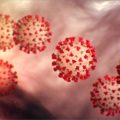
A COVID‑19 vaccine is a vaccine intended to provide acquired immunity against severe acute respiratory syndrome coronavirus 2 (SARS‑CoV‑2), the virus causing coronavirus disease (COVID‑19).
Prior to the COVID‑19 pandemic, there was an established body of knowledge about the structure and function of coronaviruses causing diseases like severe acute respiratory syndrome (SARS) and the Middle East respiratory syndrome (MERS), which enabled accelerated development of various vaccine technologies.
Types of COVID-19 vaccines
There are many types of vaccines for COVID-19. The common aim is to cause an immune response that is specific to the COVID-19 coronavirus without making us sick.
Most COVID-19 vaccines use the coronavirus ‘spike’ protein to cause this immune response. Our immune system recognizes this spike protein as foreign and produces long-lasting immune cells and antibodies. If a vaccinated person is exposed to the coronavirus at a later time, their immune system will respond faster and more effectively.
Here are some of the common types, and how they work:
Messenger RNA (mRNA)
mRNA vaccines use a genetic code called RNA to spark the production of the coronavirus’ specific spike protein. Once the mRNA enters the body’s cells, the cells use the instructions contained in the RNA to make the spike protein. Immune cells then recognise the spike protein as foreign and begin building an immune response against it. The RNA from the vaccine does not change or interact with our DNA in any way.
Protein
Protein based vaccines use a non-infectious component of the coronavirus, usually the spike protein. This protein is found on the surface of the virus and is manufactured in a laboratory. When the vaccine enters the body, immune cells recognize the spike protein as foreign. Immune cells then recognize the spike protein as foreign and begin building an immune response against it.
Vector
Vector vaccines use a harmless, weakened animal virus that contains the genetic code for a protein unique to the coronavirus, usually the spike protein. This weakened animal virus is known as a viral vector. Once this enters the body, it instructs our cells to make the coronavirus spike protein. Our cells use these instructions to make copies of the protein. Our immune cells then recognise the spike protein as foreign and begin building an immune response against it.
Currently available vaccines include AstraZeneca Vaccine, Pfizer–BioNTech, Sputnik V, Sinopharm, Sinovac, Johnson & Johnson, Moderna, and Convidecia.
How COVID-19 Vaccines Work
Vaccines train a person’s immune system to recognize and clear out germs (bacteria and viruses) that can cause serious illness. They strengthen your immune system by training it to recognize and fight against specific germs.
Vaccines are a safe way of producing an immune response in the body without causing illness. Vaccines contain either killed or weakened versions of the virus that causes the disease or a small part of it, such as a protein or nucleic acid. When you get a vaccine, your immune system recognises these as foreign. It responds by creating memory cells and antibodies that protect you against future infection.
How will a vaccine prevent COVID-19?
The coronavirus that causes COVID-19 has spikes of protein on each viral particle. These spike proteins allow the virus to attach to cells and cause disease. The vaccines help the body to “recognise” these spike proteins as foreign and fight the coronavirus that has them. The vaccine will protect a person who receives it by lowering their chances of getting COVID-19 if they encounter the coronavirus.
If you have already had COVID-19 and recovered, you may have some natural immunity to contracting the disease again. However because this virus is new, it’s not clear how long natural immunity might last.
How long does a COVID-19 vaccine last?
It is not yet known how long the protection afforded by a COVID-19 vaccine will last. This is being evaluated in ongoing research. The good news is that according to a new study recently published there is reason to believe that immunity from COVID-19 vaccines will last at least longer than six months after vaccination. But researchers are quick to add that it’s hard to predict how long immunity will last because the exact mechanisms of protective immunity used by our bodies against SARS-CoV-2 or COVID-19 are not yet known.
Both Pfizer and Moderna are currently exploring whether or not their vaccines will require boosters or genetic modifications to respond to emerging SARS-CoV-2 variants. Natural immunity (i.e. immunity in people who have been infected with COVID-19) can last for up to eight months, according to research published in Science. ALSO, READ How to Spot Fake COVID-19 Vaccines




